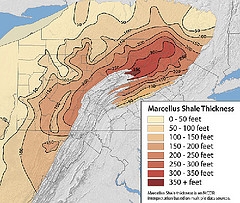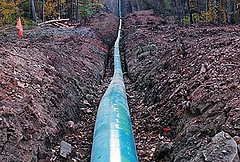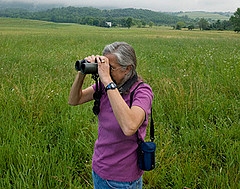Penn State scientists part of new stink bug research project
live.psu.edu/story/56032#nw69
October 27, 2011

Stink-bug damage such as this cost the mid-Atlantic apple industry an estimated $37 million in 2010. (Credit: Penn State Department of Entomology)
UNIVERSITY PARK, Pa. — Researchers in Penn State’s College of Agricultural Sciences are part of a new, multi-state project to study the brown marmorated stink bug.
The research is funded by a recently announced $5.7 million grant from the U.S. Department of Agriculture’s National Institute of Food and Agriculture through its Specialty Crops Research Initiative.
The three-year project is aimed at developing economically and environmentally sustainable pest-management practices for the brown marmorated stink bug, which has caused millions of dollars worth of crop damage and become a major homeowner nuisance since it first was found in the United States, near Allentown, in the late 1990s.
Penn State will receive nearly $900,000 of the grant to study stink bug biology and behavior, develop monitoring and management tools and practices, and provide extension education programs to disseminate new knowledge to crop producers.
“It’s too early to put a dollar value on crop damage this year, but the apple industry alone estimated losses of about $37 million as the result of stink bug infestations in the mid-Atlantic region in 2010,” said Greg Krawczyk, extension tree-fruit entomologist at Penn State’s Fruit Research and Extension Center in Biglerville.
Krawczyk, who leads the Penn State portion of the project, noted that crop damage this year appears to be lower than last year, though it varies from region to region. “Growers who experienced big losses last year managed this pest better during this season, but some individual growers still suffered losses of up to 60 percent,” he said.
Because the brown marmorated stink bug is native to Asia, it has few natural enemies in North America, allowing populations to grow largely unchecked. The pest is known to feed on as many as 300 host plants and migrates readily, further complicating control.
Krawczyk said one of the goals of the research is to develop control tactics that rely on the principles of IPM, or integrated pest management. IPM utilizes a variety of methods — including biological controls, pheromones for mating disruption and other techniques — that help minimize pesticide use.
He explained that some broad-spectrum pesticides that are effective against stink bugs also kill the beneficial insects tree-fruit growers rely on as part of IPM programs. “That upsets the balance in the orchard ecosystem — allowing other pests to become more of a problem — and could reverse much of the progress we’ve made in IPM, which has helped Pennsylvania growers to reduce pesticide use by as much as 75 percent in recent decades.”
Penn State scientists will study stink bugs as they relate to the production of tree fruits, vegetables and grapes. Researchers will explore biological control options, stink-bug chemical ecology (chemically mediated interactions among plants and insects), and monitoring strategies. The project also will assess the pest’s economic impact and the economic feasibility of new management methods.
Krawczyk said although the research will focus mostly on specialty crops and will not directly address infestations in homes or in major agronomic crops such as corn and soybean, knowledge gained should aid in the development of recommendations that could be useful for habitat-scale management.
Other Penn State personnel taking part in the project include David Biddinger, senior research associate in entomology at the Fruit Research and Extension Center; Gary Felton, professor and head of entomology; Shelby Fleischer, professor of entomology; Jayson Harper, professor of agricultural economics; Steven Jacobs, senior extension associate in entomology; Michael Saunders, professor of entomology; and John Tooker, assistant professor of entomology.
The project is led by USDA’s Agricultural Research Service, along with a core group of land-grant universities: Penn State, Rutgers, Virginia Tech, and the universities of Maryland and Delaware. Also participating are researchers from Cornell, Oregon State University, North Carolina State University, Washington State University and the Northeast IPM Center.
More information about the brown marmorated stink bug is available online at http://ento.psu.edu/extension/factsheets/brown-marmorated-stink-bug.
Drilling’s effects to be analyzed
www.timesleader.com/news/Drilling_rsquo_s_effects_to_be_analyzed_10-16-2011.html
MATT HUGHES mhughes@timesleader.com
October 17, 2010
Penn State database will look at impact of natural gas on groundwater resources.
Researchers at Penn State University will build a database to analyze the impact of natural gas drilling on Pennsylvania’s groundwater resources.
Funded by a $750,000 grant from the National Science Foundation, the research initiative aims to consolidate water data collected by government agencies, universities, industry stakeholders and citizens groups into a searchable database accessible to the public online.
“It’s very clear that the rate of drilling in the state is going faster and faster, and there have been some impacts on water, so we want to help the people of Pennsylvania pull together some of that data and analyze that impact,” said Susan Brantley, project leader and director of the university’s Earth and Environmental Systems Institute.
Brantley said drilling’s effects on the state’s water resources have thus far been localized, and she expects the statewide data will reflect those localized impacts rather than an overall statewide pattern, but the consolidation of data will also give scientists and lawmakers a sense of the industry’s overall impact on the state’s natural resources.
The data will be posted by the university to a website where users will be able to search and plot data using various search criteria, and researchers at Penn State and other colleges will conduct their own analysis of the data as it is posted.
The challenge, Brantley said, will be to encourage well owners to submit their data, as water well testing is frequently done by homeowners and companies who may not wish to make their data public. The database will maintain anonymity, and will have quality control measures in place to ensure data submitted is genuine and valid, Brantley said.
Eventually, the university plans to train community groups to collect and interpret water data, and is planning a workshop in the spring.
Wilkes University professors Ken Klemow and Dale Bruns, who are conducting their own Department of Energy-funded surface water tests and are working towards building a similar database to Penn State’s for Northeastern Pennsylvania, said the Penn State database will complement their own research and that they hope to find ways to work with the Penn State researchers.
“People are very concerned about water quality as it relates to the Marcellus,” Klemow said. “There have been some statements made, especially in the press, saying that water supplies have been completely decimated, and then you have the industry saying there’s been no impact at all. To settle this question you really need to do the good science.
Safe Drinking Water program planned for Oct. 15
www.recordonline.com/apps/pbcs.dll/article?AID=/20111007/COMM011101/110070301/-1/NEWS
Published: 10/07/11
HAWLEY, Pa. — If your well was flooded after the recent visit by Hurricane Irene or Tropical Storm Lee or any other high water event, then you need to test your water for a number of potentially harmful substances such as bacteria and nitrates, which can have health effects on you and your family.
In addition, your well could have high levels of iron, manganese and copper, which can cause unwanted stains and odors.
If you depend on your own well or spring for your drinking water, it is your responsibility to have your water tested periodically at a certified water testing lab. No government agency is going to require you to have your water tested.
Penn State Cooperative Extension in Pike County will be conducting a Safe Drinking Water program from 9-11 a.m. Oct. 15 at the PPL Environmental Learning Center on Route 6 in Hawley, Pa. There is a registration fee of $10 for handouts.
To register for the Safe Drinking Water program, go to the website http://guest.cvent.com/d/icq7m2 or call 877-489-1398 and mention the Oct. 15 Safe Drinking Water Seminar. The registration deadline is Wednesday.
In addition, Penn State Cooperative Extension is offering water testing for a discounted fee through Prosser Labs on Oct. 19 and 26 and Nov. 2. In order to participate in the water testing, you must attend the Safe Drinking Water program to receive your test bottles.
Four different sets of water tests will be offered, ranging from coliform bacteria and E. coli bacteria to a test of seven other parameters. Test bottles need to be returned by noon Oct. 19 or 26 or Nov. 2.
For more information on the Safe Drinking Water program or water testing, contact Peter Wulfhorst at the Penn State Cooperative Extension office at 570-296-3400 or visit the Pike County Cooperative Extension website at http://extension.psu.edu/pike and go to events.
Sept. 15 webinar to examine Marcellus gas legal issues
http://live.psu.edu/story/54984#nw69
UNIVERSITY PARK, Pa. — A Web-based seminar to be presented at 1 p.m. Sept. 15 by Penn State Extension will examine legal issues associated with natural-gas development in the Marcellus Shale formation underlying Pennsylvania.
There have been more than 2,350 wells drilled into the Marcellus in the Keystone state in the last few years, primarily in the southwest, northeast and northcentral regions. Those wells and wellpads, the gas they produce and construction of related infrastructure, such as pipelines and transfer stations, have created legal dilemmas for residents and municipalities.
In the webinar, which will run for more than an hour, presenter Ross Pifer, clinical professor of law and director of the Agricultural Law Resource and Reference Center at Penn State’s Dickinson School of Law, will talk about legal developments, encompassing statutes, regulations and court opinions at the state and federal level.
“I will review the various Marcellus Shale legal developments that have occurred over the past several months as well as those that are ongoing,” he said.”I will discuss the legislation that has been enacted by the Pennsylvania General Assembly and cover some of the other topics that are being considered by the General Assembly and U.S. Congress.”
Pifer also intends to discuss regulations and other ongoing administrative proceedings from the U.S. Environmental Protection Agency, Susquehanna River Basin Commission, Delaware River Basin Commission, Pennsylvania Public Utility Commission and the state Department of Environmental Protection.
As Marcellus activities occur throughout much of the commonwealth, the legal developments related to Marcellus Shale continue to increase, Pifer noted. “I will cover the issue of municipal regulation of natural-gas operations, and I will address highlights from court opinions that have been issued by state and federal courts in Pennsylvania.
“The goal of this webinar is to highlight the numerous legal developments to provide the participants with an overview of the legal landscape surrounding Marcellus Shale.”
The webinar is part of a series of online workshops addressing opportunities and challenges related to the state’s Marcellus Shale gas boom. Information about how to register for the session is available on the webinar page of Penn State Extension’s natural-gas website at http://extension.psu.edu/naturalgas/webinars.
Previous webinars, publications and information on topics such as air pollution from gas development; the gas boom’s effect on landfills; water use and quality; zoning; gas-leasing considerations for landowners; implications for local communities; and gas pipelines and right-of-way issues also are available on the Penn State Extension natural-gas website (http://extension.psu.edu/naturalgas).
For more information about the webinar, contact John Turack, extension educator in Westmoreland County, at 724-837-1402 or by email at jdt15@psu.edu.
Webinars will focus on business opportunities related to Marcellus gas
http://live.psu.edu/story/54563#nw69

The Marcellus Shale formation deep underground -- and the natural gas it holds -- represents a huge economic engine for Pennsylvania.
UNIVERSITY PARK, Pa. — A series of Web-based seminars aimed at helping local businesses prosper from natural-gas drilling and development will be offered this fall by Penn State Extension’s Marcellus Educational Consortium.
“Your Business and Marcellus Shale: Moving Forward 2011” is a five-part program intended to help local businesses understand and take advantage of the opportunities arising from development of the Marcellus Shale.
“Participants will expand their knowledge of the opportunities that exist in the market and learn how to make connections and plan for doing business in this growing industry,” said Jonathan Laughner, extension educator in Beaver County who is moderating the sessions, one of which will be held every other week. Each webinar will feature speakers who are experts in the field.
“Our webinar speakers will include natural-gas industry representatives, local business people successfully responding to opportunities, financial specialists and business-development representatives,” Laughner said. “Anyone interested in learning more about this aspect of the industry is welcome to attend.”
Each session will last approximately 75 minutes, from 9 a.m. to 10:15 a.m. Following is the webinar schedule:
–Sept 13, “Local Business View: Experience in the Northeast”
–Sept. 26, “Industry View: What Does Industry Look For?”
–Oct. 11, “Local Business View: Experience in the Southwest”
–Oct. 24, “The Process: How Do You Sell Into Industry?”
–Nov. 8, “The Work Plan: Financial and Planning Suggestions”
This webinar series is for educational purposes only, Laughner cautioned. No part of the presentations is to be considered legal advice. “Please consult with your attorney before signing any legal document,” he said. “Where trade and/or company names appear, no discrimination is intended, and no endorsement by Penn State Cooperative Extension is implied.”
The website for the webinars is https://meeting.psu.edu/marcellusbiz. Webinar access requires a free Friends of Penn State account, which can be obtained at https://fps.psu.edu.
For more information, contact Carol Loveland, Penn State Extension energy development and special projects coordinator, at 570-433-3040 or by e-mail at cal24@psu.edu.
Researchers: Marcellus gas not hurting or helping municipal finances
http://live.psu.edu/story/54506#nw69
Monday, August 15, 2011
UNIVERSITY PARK, Pa. — While being credited by many as a major new economic engine for Pennsylvania, Marcellus shale gas-development so far may not be having much of an effect on the finances of local municipalities, according to a study by two researchers in Penn State’s College of Agricultural Sciences.
Michael Jacobson, associate professor of forest resources, and Tim Kelsey, professor of agricultural economics, examined how gas drilling and production activities are affecting municipal government and services in two rural counties where they are occurring.
They examined a decade of revenue and expenditure data from more than three dozen townships in Washington and Susquehanna counties, all of which are experiencing significant Marcellus Shale activity.
“Surprisingly, we found no significant differences in spending or revenue collection before and after Marcellus activity in those townships,” said Jacobson, who specializes in forest economics, finance and policy. “The statistical analysis of the audit information showed no clear relationships between Marcellus Shale activity and municipal finances.”
The researchers cautioned, however, that as the scale of Marcellus development increases, municipalities may need to provide new services they do not currently support. Municipalities also may discover they need to expand existing services such as planning and management.
“We had only two solid years of fiscal data as gas development is relatively new,” Jacobson said. “I think as the gas play expands, our conclusions will change — a lot will depend on the rate of scaling up development and accompanying fiscal impacts.”
The researchers noted that in the townships studied, gas companies were mostly proactive in repairing and upgrading roads damaged by gas-related traffic, and that helped municipal budgets as road maintenance and repair account for a large share of municipal spending.
But some municipalities reported having to hire new staff to deal with Marcellus issues — an unanticipated cost — or having to shift responsibilities of existing staff.
“Municipalities identified a range of impacts their local governments were experiencing as a result of Marcellus Shale development, but they stated that so far, most have been either nonmonetary or they have internally shifted resources to cover them, so the impacts do not appear in the municipal budget,” Jacobson said.
“Even with significant gas development, some officials said they have not ‘spent a nickel’ on gas-related issues.”
In addition to examining local government audit data for each year from 2001 to 2009, the researchers conducted focus group interviews with municipal officials in both counties.
“There may be unforeseen costs that crop up — environmental and infrastructure-related come to mind,” Jacobson said. “On the positive side, the play already has brought new jobs, industry and development that will provide added revenues to help offset the cost of these services.”
A Marcellus Education Fact Sheet detailing the findings of the research is available at http://pubs.cas.psu.edu/freepubs/PDFS/EE0006.pdf online.
This research was supported by the Marcellus Seed Grant Research Program, an initiative of the Penn State Marcellus Center for Outreach and Research with funding from the Penn State Institutes of Energy and the Environment and the Penn State Social Science Research Institute. For more information, visit http://www.marcellus.psu.edu/ online.
Information about the Marcellus Seed Grant Research Program can be found at http://marcellus.psu.edu/research/seedGrant.php online.
To learn about other research supported by the center, visit http://marcellus.psu.edu/resources/publications.php online.
For more information, contact the Marcellus Center for Outreach and Research at 814-865-1587 or at marcellus@psu.edu.
Aug. 25 webinar to examine effect of Marcellus gas activity on habitat
http://live.psu.edu/story/54504#nw69
Thursday, August 11, 2011
UNIVERSITY PARK, Pa. — As the Marcellus natural-gas boom has reverberated around Pennsylvania, residents and scientists alike have expressed concern about the impact extensive drilling and associated infrastructure development is having on wildlife habitat.
Wildlife managers and protectors are worried about forest fragmentation, the advance of invasive plant species and the effect the Marcellus play is having on activities such as hunting, fishing, bird watching and wildlife viewing.
There have been more than 2,350 wells drilled into the deep Marcellus formation under Pennsylvania in the last few years, primarily in the southwest, northeast and northcentral regions.
A Web-based seminar presented by Penn State Extension will offer a look at the latest information on the subject. Titled, “A Research Update on the Effects of Marcellus Shale Drilling on Wildlife Habitat,” the one-hour session will take place at 1 p.m. on Aug. 25.
“The webinar will cover landscape and habitat changes associated with Marcellus Shale exploration and development, and how that may affect Pennsylvania wildlife and wildlife-associated recreation,” said presenter Margaret Brittingham, professor of wildlife resources in the College of Agricultural Sciences.
“I will discuss research we recently have completed on shallow wells and give an overview of our current research project, which is looking at the effects of Marcellus Shale gas exploration and development on wildlife habitat in general and forest songbirds in particular.”
Pennsylvania contains internationally important breeding habitat for a number of neotropical migrant songbirds that — if degraded — would affect world populations, Brittingham noted. And much of the extensive gas development is occurring in the state’s northern tier, where some of the densest forests in North America provide ecologically vital bird habitat.
However, that new research is in its early phase, Brittingham explained. “We currently are collecting baseline data and determining whether there are any detectable changes at this stage of development,” she said.
“I will conclude the webinar by discussing habitat-restoration needs, guidelines and opportunities, both for minimizing potential problems and enhancing habitat quality.”
The webinar is part of a series of online workshops addressing opportunities and challenges related to the state’s Marcellus Shale gas boom. Information about how to register for the session is available on the webinar page of Penn State Extension’s natural-gas website at http://extension.psu.edu/naturalgas/webinars.
A webinar at 1 p.m. on Sept. 15 will focus on current legal issues in shale-gas development.
Previous webinars, publications and information on topics such as air pollution from gas development; the gas boom’s effect on landfills; water use and quality; zoning; gas-leasing considerations for landowners; implications for local communities; and gas pipelines and right-of-way issues also are available on the Penn State Extension natural-gas website (http://extension.psu.edu/naturalgas).
For more information about the webinar, contact John Turack, extension educator in Westmoreland County, at 724-837-1402 or by email at jdt15@psu.edu.
Your Private Drinking Water and the Natural Gas Industry (Part Two)
http://www.northcentralpa.com/news/2011-07-17_your-private-drinking-water-and-natural-gas-industry-part-two
July 17, 2011
By Penn State Cooperative Extension in Gas Industry
Part two of an article on considerations for private drinking water wells and natural gas drilling
At Penn State Extension’s programs that focus on protection and testing of private water supplies near natural gas drilling, Bryan Swistock, water resource extension specialist provides valuable information and practical advice for people interested in protecting their private drinking water supplies. Knowing the quality of your home well or spring water before natural gas drilling is critical to knowing if that quality changes or is impacted by natural gas drilling (or any other factors, for that matter). Swistock says if you want to legally document your water quality prior to any drilling occurring, you need to use a third-party, state-certified test lab. Importantly, he says that many drilling companies conduct what is called “pre-drilling survey” water testing.
“This is a survey of drinking water supplies in the vicinity of the natural gas drill site. The survey is not actually performed by the drilling company, but by a third-party, accredited testing firm,” says Swistock. “If you are asked to participate in such a survey, it’s in your best interest to do so, since the drilling company will pay for the water test.”
Swistock says people always have the option of paying for their own water testing. He says there are several factors to consider.
As far as “what” to test for when testing your drinking water supply, Swistock recommends a tiered approach. “There’s no perfect answer, but I suggest setting some priorities – ask yourself what is most critical to test for and start there. Prioritize and determine what you can afford to test for. If you are financially able to do more, there are some additional parameters you could consider.”
Once you’ve decided to have your drinking water tested, and have determined what to test for, understanding the results can be complex. Swistock says the report you will receive from the certified testing lab is considered a legal document, and it can be difficult to understand what the numbers mean.
“Many Penn State Cooperative Extension offices have both the people resources and informational materials to help people better understand their water test results. In fact, there’s an on-line form to help people interpret test results. You can also ask the lab that conducted the test if they will explain the results to you,” says Swistock.
Swistock also provided a number of informational web sites. He said the eNotice web site atwww.dep.state.pa.us/enotice/ allows people to sign up to receive e-mail notices when drilling is going to occur in a specific municipality or county.
Swistock says there are a number of pro-active measures people can take to protect their drinking water. For people leasing land to drillers, he recommended several stipulations that should be included as part of the lease. He also urged people to report problems and concerns to the PA Department of Environmental Protection, which has regulatory oversight for the natural gas activities in the region.
In addition, Swistock says researchers at Penn State University, through the Center for Rural Pennsylvania, have begun natural gas-related research to monitor drinking water wells and gather data.
Swistock finishes his presentations by noting the vast amount of information that is available from the Extension Office. He encouraged people to visit their web site at http://extension.psu.edu/naturalgas
Excerpted from the Clinton County Natural Gas Task Force (www.clintoncountypa.com ) weekly columns.
July 21 webinar to focus on natural gas pipelines
http://live.psu.edu/story/54077#nw69
Friday, July 8, 2011

The type of pipeline -- whether it’s a gathering line or a much larger interstate transmission line -- determines how much surface disturbance takes place.
University Park, Pa. — A Web-based seminar to be presented by Penn State Extension July 21 will explore pipeline development and regulation in regions of the state being intensely affected by drilling for natural gas in the Marcellus Shale formation.
Speaking in the webinar will be Wayne County extension educator Dave Messersmith, based in Honesdale, who is part of Penn State’s Marcellus Education Team and coordinates the university’s annual Marcellus Summit, and Paul Metro, chief of the Gas Safety Division of the Pennsylvania Public Utility Commission.
They will discuss pipeline construction, associated surface infrastructure (valves, compressor stations, etc.), pipeline impacts on the landscape and in communities, ways to reduce pipeline impacts, negotiating terms for a pipeline right-of-way and regulatory oversight of gas pipelines in Pennsylvania.
There have been more than 2,300 wells drilled into the deep Marcellus layer in Pennsylvania in the last few years, primarily in the southwest, northeast and northcentral regions. Many pipelines have been and are being built to get the large volume of gas they produce to consumers.
A pipeline right-of-way is a strip of land over and around natural gas pipelines where some of the property owner’s legal rights have been granted to a pipeline operator, Messersmith said. A right-of-way agreement between the pipeline company and the property owner is also called an easement, which is usually filed in the county Register and Recorders Office with property deeds.
“Many people are concerned about eminent domain as it relates to pipelines,” he said. “In reality the type of pipeline — whether it’s a gathering line or an interstate transmission line — will determine who provides regulatory oversight and whether eminent domain is possible.”
Penn State Extension offers a publication called “Negotiating Pipeline Rights-of-Way in Pennsylvania,” which Messersmith authored, for people interested in knowing more about pipeline issues. Part of the Marcellus Fact Sheet Series, single copies can be obtained free of charge by Pennsylvania residents through county Penn State Extension offices, or by contacting the College of Agricultural Sciences Publications Distribution Center at 814-865-6713 or AgPubsDist@psu.edu. The publication also is available in digital format at http://pubs.cas.psu.edu/FreePubs/PDFs/ua465.pdf online.
The July 21 webinar is part of a series of online workshops addressing opportunities and challenges related to the state’s Marcellus Shale gas boom. Information about how to register for the webinar is available on the webinar page of Penn State Extension’s natural-gas website at http://extension.psu.edu/naturalgas/webinars online.
Future webinars will focus on a research update on the effects of shale drilling on wildlife habitat and current legal issues in shale-gas development.
Previous webinars, publications and information on topics such as air pollution from gas development, the gas boom’s effect on landfills, water use and quality, zoning, gas-leasing considerations for landowners, and implications for local communities also are available on the Penn State Extension natural-gas website, at http://extension.psu.edu/naturalgas online.
For more information, contact John Turack, extension educator in Westmoreland County, at 724-837-1402 or jdt15@psu.edu.
Program will focus on water safety
http://www.njherald.com/story/news/23Local-briefs2011-06-22T21-37-09
HAWLEY, Pa. — Penn State Extension in Pike County will conduct a Safe Drinking Water program from 6:30 to 8:30 p.m. June 29 at the PPL Environmental Learning Center on Route 6 in Hawley. There is a registration fee of $7 per person or couple for handouts. Pre-registration, including payment, is required by Friday. Make checks payable to PSCE Program Account and mail to Penn State Extension, 514 Broad St., Milford, PA 18337.
In addition, Penn State Extension is offering water testing for a discounted fee through Prosser Labs on July 6, 13 and 20. In order to participate in the water testing, you must attend the Safe Drinking Water program to receive your test bottles. Four different sets of water tests will be offered ranging from coliform bacteria/e coli bacteria to a test of seven other parameters including coliform bacteria. Test bottles need to be returned to the Extension office by noon on July 6, 13 and 20.



